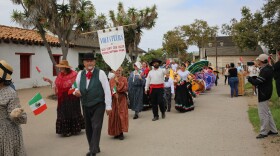DEBBIE ELLIOTT, host:
A report now from Colombia where criminal organizations are constantly evolving. When one dies off in a hail of bullets, another seems to spring up with names like the Black Hand or the Machos.
The government calls them drug-trafficking gangs, but international bodies, like the U.N. and the Organization of American States, say they include former members of right-wing death squads. These paramilitary groups were supposed to disarm under a government-run demobilization but many it turns out could not resist a life of crime.
NPR's Juan Forero reports from one state in southwest Colombia where the problem is most severe.
Unidentified Man #1: (Foreign language spoken)
(Soundbite of whistling)
JUAN FORERO: It's almost nightfall and policemen in the town of Egido have put down their assault rifles. They relax with a rousing game of soccer. But as the sun goes down, the Purple Mountains where Egidos nestled grow dark and menacing.
This state Narino is heavy in what human rights' workers call new paramilitary groups. Men outfitted with high-powered weapons, wearing camouflage and handling high-tech communications equipment, all that's needed to fight Marxist rebels for control of the region's flourishing and lucrative cocaine trade.
That's not the way it was supposed to have been when nearly 700 paramilitary fighters from the United Self-Defense Forces of Colombia, or AUC, laid down their weapons here in 2005. They pledged to never again fight the guerillas or terrorize civilians. That had been the hallmark of the AUC, a coalition of paramilitary groups that operated in much of Colombia.
Luis Gonzalo-Rosero(ph), the rector of a local school says the demobilization meant little change in this part of Colombia. A few reinserted, he says, using the government phrase for those who gave up a life of crime.
Mr. LUIS GONZALO-ROSERO (Local School Rector, Narino, Colombia): (Through translator) The rest continue to operate as always but with different names. It's still taxed us. It's still carry out operations like they did in the past.
(Soundbite of music)
FORERO: At Rosero's school, a therapist holds a session, complete with soft new age music, for women who've been thrown off their land because of the fighting. One woman is Maria Narvaez(ph).
Ms. MARIA NARVAEZ (Resident, Colombia): (Spanish spoken)
FORERO: She recalls how she had to flee a gunfight to save her life. Colombian officials acknowledged the problems, but President Alvaro Uribe's government says the new groups compared to the old AUC are much less organized, smaller and more focused on drugs rather than on terrorizing poor families.
General Oscar Naranjo(ph) says his police force is aggressively fighting the scourge and has arrested 1,700 fighters since March of last year.
General OSCAR NARANJO (Colombia): (Through translator) For us, it's a priority to combat and neutralize them.
FORERO: American officials in the White House Drug Czar's office and at the State Department say the groups lack the national reach or the political objectives of the old paramilitary structure.
Thomas Shannon is the State Department highest official for Latin America.
Mr. THOMAS SHANNON (Assistant Secretary, U.S. Department of State): I wouldn't call them paramilitary groups. I mean, I would call them drug-trafficking organizations or weapons-trafficking organizations or criminal organizations.
FORERO: Still, new studies show that the emerging gangs are found in one of every five counties and may number as many as 5,000 men. There are also reports that they've targeted civilians, displaced peasants off farmland and threatened rights workers. Indigenous groups have also been targeted.
Mr. EDUARDO CANTICUS(ph) (Resident, Colombia): (Spanish spoken)
FORERO: At a recent conference of war victims, Eduardo Canticus explained in his native tongue how the new groups threat in his community, the Arhua(ph), and how they're trying to force the Arhua off their land.
Sergio Caramagna heads the OAS mission in Colombia. His office monitors the demobilization and produced a report on the new groups.
Mr. SERGIO CARAMAGNA (Director, OAS National Office in Nicaragua): (Through translator) The danger is that these groups have a big fountain of revenue that comes from narco-trafficking. It permits them to develop, recruit people and to continue affecting the population.
FORERO: One of the most troubled regions is Northeast Cesar state. The new groups not only traffic drugs there but they've threatened trade union activists and candidates in October's local elections.
(Soundbite of noise)
FORERO: On a recent day, Alberto Bautista(ph), a union worker, showed how he opened the creaky door to his house early one morning and was met by would-be assassin's bullet. It missed by inches.
Mr. ALBERTO BAUTISTA (Union Worker): (Through translator) He fired just one shot, but hit me near my ear - but, fortunately, in the wall.
FERERO: He's since left La Jagua, epicenter of the new groups in Cesar. Many other people remain and are bracing for trouble.
Juan Ferero, NPR News in Narino, Colombia. Transcript provided by NPR, Copyright NPR.





